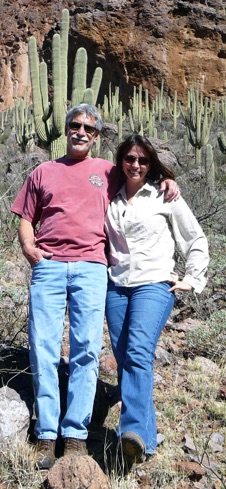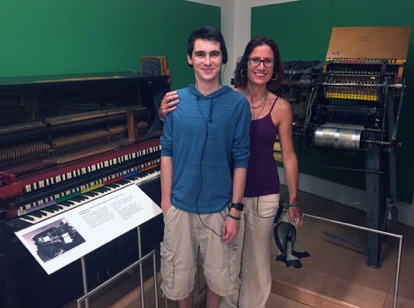Richard C. Brusca




Welcome to Richard C. Brusca’s web site. Rick is an invertebrate zoologist, marine biologist, conservation ecologist, cultural anthropologist, Southwestern naturalist, and desert rat. He is Executive Director, Emeritus, of the Arizona-Sonora Desert Museum (and currently a Research Associate) and a Designated Campus Colleague, University of Arizona. Rick is the author of over 230 papers & essays and 20 books, including the largest-selling text on invertebrate zoology (Invertebrates 4th ed., Sinauer Associates/Oxford University Press; available in four languages) and the popular field guides Common Intertidal Invertebrates of the Gulf of California, A Seashore Guide to the Northern Gulf of California, and A Natural History the Santa Catalina Mountains, with an Introduction to the Madrean Sky Islands. Books written by Rick have won numerous awards, including Southwest Book of the Year, the New England Book Show's Best College Text, a BIBA Award for Best Literary Fiction (2022), and an IPPY Award for Best Hispanic-Latin Fiction (2024).
Books Rick developed, edited, and produced for the Arizona-Sonora Desert Museum Press have won over a dozen awards, including three IPPY’s, the AAAS Children’s Science “Highest Rating” award, the Arizona State Libraries One Book Award (one book that every Arizona child should read), Américas Award for Latin American Studies, Moonbeam Gold Medal for Spanish Language Children's Books, and the Tabasco Regional Cookbook Award.
Rick is also an essayist and editorialist publishing in a number of magazines and newspapers in the US and Mexico. He believes scientists have an obligation to educate and inform the public at the intersection of science and policy, especially at this critical time when public perceptions of science and scientists has fallen. He also believes that, as scientists and educators, we have a duty to speak truth to power in our areas of knowledge and in academia in general. Rick encourages all scientists to make stronger connections with their communities by engaging in science communication as a regular part of their work.
Rick has been the recipient of more than 100 research grants from the National Science Foundation, NOAA, National Geographic Society, Charles Lindberg Foundation, National Park Service, The David and Lucile Packard Foundation, and many other agencies and foundations. His areas of greatest interest are the Sea of Cortez, the Sonoran Desert, and Mexico/Mesoamerica. He has served on panels and boards for many foundations and agencies, including the National Science Board, National Science Foundation, Smithsonian Institution, NOAA, PEW Program in Conservation and the Environment, Public Broadcasting Service, IUCN Species Survival Commission, U.S. Department of the Interior, IUCN, NCEAS, and others. He has served on more than a dozen non-profit boards and was co-founder of the Western Flyer Foundation (http://www.westernflyer.org) and the Southern Arizona Buffelgrass Coordination Center (SABCC). Although he has organized and conducted field expeditions throughout the world, in over 50 countries and on every continent, he has maintained his research programs in the Sonoran Desert and the Gulf of California for more than 40 years. He is an elected Fellow in the American Association for the Advancement of Science (AAAS), the Linnean Society of London (FLS), and the California Academy of Sciences. He is also a National Geographic Explorer, the recipient of a U.S. Department of Defense Civilian Service Medal , and the Luminaria Award from the Arizona-Sonora Desert Museum.
While science is a powerful method for exploring and understanding humanity, nature, and the universe, there are other ways of understanding, including art and music, and even meditation, loving, and more. One of the most powerful paths to understanding is through literature—particularly literary fiction and creative nonfiction. All of these endeavors are driven by the same fundamental human impulses of curiosity, observation, contemplation, the search for meaning in the natural world, and creativity; these are indelible aspects of human nature. So it is not surprising that there are many parallels between science and art, and the most creative of scholars/artists work at the disquieting yet tantalizing penumbra between knowing and not knowing, certainty and uncertainty, left and right brain—often revealed by removal of unrecognized blinders or by some unconventional approach. Our greatest learning moments come not just from acquiring information, but from that which makes our insights and personal lives grow—from gaining wisdom. If you stand on the shore of curiosity long enough, fantastic things may wash up at your feet.


-
•Daughter Carlene Brusca with grandson Giovanni Ricardo Brusca.
-
•RCB and wife Wendy Moore.
• Rick Brusca’s primary region of interest.





For information on the novel, In the Land of the Feathered Serpent, please visit: www.featheredserpent.online. The novel, The Time Travelers, is available at Amazon.com and selected bookstores (see https://sanfranciscobookreview.com/product/the-time-travelers/).
Rick’s recent essays and editorials are at: https://www.featheredserpent.online/recent-op-ed-pieces
To listen to a 2021 UA College of Science interview with Rick, use this link:
Spotify: https://open.spotify.com/episode/030MbpZrFWKT5iXISWh0Jw?si=ycNcT_CURISWOJupWSqtgg
